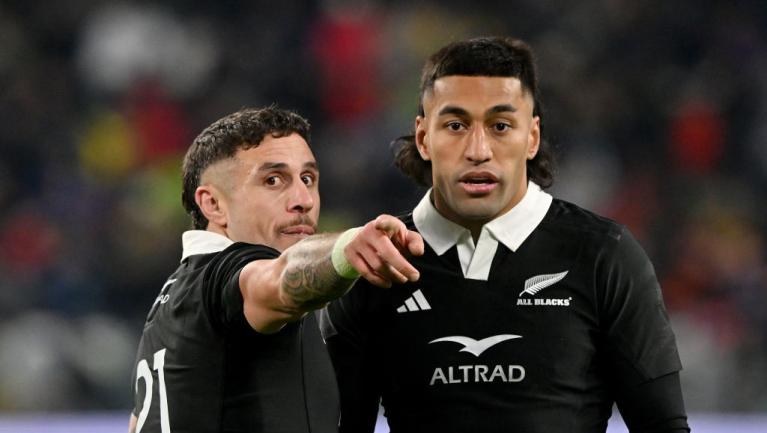The 11 All Blacks ranked between 41 and 100 on the RugbyPass Top 100 list

Eleven All Blacks players have been selected between 41 and 100 on the RugbyPass Top 100 list, which ranks the sport's best rugby players in 2024.
The RugbyPass Top 100 rankings factor in on-field achievements, leadership, consistency, raw talent and off-field influence created with input from rugby writers and experts worldwide.
Caleb Clarke slots in at 85 after a return to form in 2024. Clarke’s devastating blend of pace and power on the wing has made him a standout for both the Blues and the All Blacks, earning him a spot ahead of notable names like South Africa’s Manie Libbok and Argentina’s Marcos Kremer.
At 81, Sam Cane’s presence reflects his enduring influence on the All Blacks despite being stripped of the captaincy.
Despite criticism at times [think Peter O'Mahony], Cane’s defensive workrate remains remarkable. He places ahead of Argentina’s Julian Montoya and Wales’ Dewi Lake.
Hooker Codie Taylor is listed at 76. The outstanding No.2's ranking places him among the list's elite frontrowers, above the likes of France’s Julien Marchand and Scotland’s Zander Fagerson.
Emerging halfback talent Cam Roigard lands at 72, a testament to a meteoric rise over the course of the last 18 months. The Hurricanes halfback has brought a spark to the All Blacks with his sharp decision-making and electric runs, earning him a place above South Africa’s Damian Willemse and France’s Thomas Ramos.
Damian McKenzie comes in at 66, with his trademark flair and versatility keeping him among the most exciting players in the game. 'D-Mac's' ability to dictate play from either fullback or fly-half places him higher than Scotland’s Duhan van der Merwe and England’s Owen Farrell.
In the front row, Tyrel Lomax earns his spot at 60, just ahead of Richie Mo’unga at 59. Lomax’s ranking reflects his rise as a cornerstone of New Zealand’s scrum, surpassing established internationals like Ireland’s Hugo Keenan and France’s Emmanuel Meafou.
Despite not being involved with the All Blacks currently, Mo’unga’s creativity and game management as a playmaker secure him a position above players like Australia’s Rob Valetini and South Africa’s Frans Malherbe.
Maybe controversially, Scott Barrett appears at 56, his ranking highlighting his consistent performances as one of the All Blacks’ most dependable forwards. The Crusaders lock edges out players like Wales’ Jac Morgan and France’s Louis Bielle-Biarrey.
Some argue Barrett - who can slot in at blindside - deserves a higher spot in the ranking.
Johnny Sexton's nemesis Rieko Ioane is at 53. The 27-year-old is ranked above South Africa’s Jesse Kriel and Scotland’s Blair Kinghorn. He remains one of the most dangerous centres in the game.
Tupou Vaa’i is listed at 41. With 40 caps to his name at the age of just 24, Vaa’i’s athleticism and versatility have seen him develop into a key option in both the second and back rows for New Zealand. His ranking puts him 15 places ahead of fellow All-Black second-row Scott Barrett.
Players ranked 40 – 21 will be revealed on Monday, 9 December.
Latest Comments
Yeah he’s just the backups backup instead, so he still needs to be playing 10 constantly.
The four other franchises are the ones looking likely to produce someone to take his position in the team.
Go to commentsThere’s certainly an expectation about Kailea JM, and I think you’re right about his prospects. Does feel like Hodgman has come past him though, on current form. And he’s only 31, I had it in my head he was older than that..
Go to comments